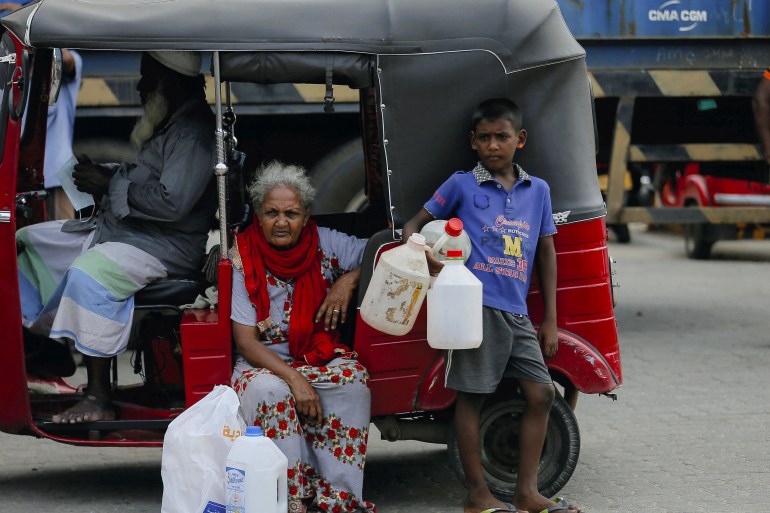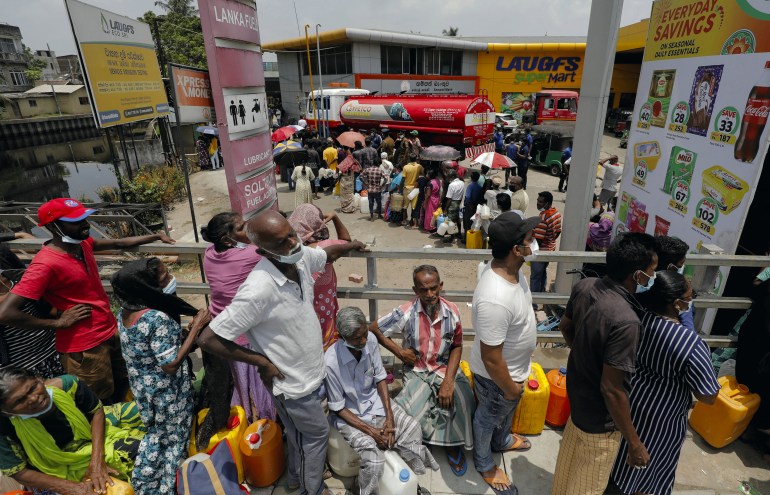Sri Lanka deploys troops as fuel shortage sparks protests
Crisis-hit island nation orders troops as protests erupt among thousands of people queueing daily for scarce fuel.

Sri Lanka has ordered its military to post soldiers at hundreds of petrol stations to help distribute fuel after a sudden rise in prices of key commodities and the accompanying shortages forced tens of thousands of people to queue for hours.
The Indian Ocean island nation is battling a foreign exchange crisis that forced the devaluation of its currency and hit payments for essential imports such as food, medicine and fuel, prompting the government to approach the International Monetary Fund.
The decision to position troops near petrol pumps and kerosene supply points came after three elderly people dropped dead during their wait in long queues, officials said on Tuesday.
“At least two army personnel will be deployed at every fuel pump,” military spokesman Nilantha Premaratne told Reuters news agency, adding that the soldiers would help organise fuel distribution, but would not be involved in crowd control.

The move was a response to complaints of stockpiling and inefficient distribution, said government spokesman Ramesh Pathirana.
“The military has been deployed to help the public, not to curtail their human rights,” he added.
‘Tempers getting frayed’
Tension over the scarcity of supplies has led to sporadic violence among residents jostling to buy fuel and other essential items.
Police said a man was stabbed to death on Monday in an argument with the driver of a three-wheeled vehicle, while last week three elderly men died while queueing to buy fuel in sweltering heat.
“Tempers are getting frayed as queues get longer,” a top defence official told AFP news agency on condition of anonymity.
“A decision was made [Monday] night to call out soldiers to reinforce the police. This is to discourage any unrest.”
Military officials said soldiers were deployed at pumping stations of the state-run Ceylon Petroleum Corporation, which accounts for two-thirds of the fuel retail business in the nation of 22 million people.

Visuals of an incident shared on social media on Monday showed a group of angry women blockading a coach carrying tourists to protest against shortages of kerosene needed for cooking stoves.
Numerous petrol stations saw people camping overnight to wait for diesel and gasoline purchases, police said.
President Gotabaya Rajapaksa’s office announced a summit of all political parties on Wednesday to discuss the economic crisis, but opposition groups said they planned to boycott the meeting.
Sri Lanka’s financial crisis stems from a critical shortfall of foreign currency, leaving traders unable to finance imports.
The COVID-19 pandemic throttled the island’s tourism sector – a key foreign exchange earner – and remittances from Sri Lankans working overseas have also declined sharply.
Rajapaksa announced last week that the country will seek an IMF bailout.
Shortages have wrought havoc on almost every aspect of daily life, with authorities last week postponing term tests for millions of students because of a lack of paper and ink.

%20(2)%20(1)%20(1)%20(1).png)
No comments:
Post a Comment
Note: only a member of this blog may post a comment.